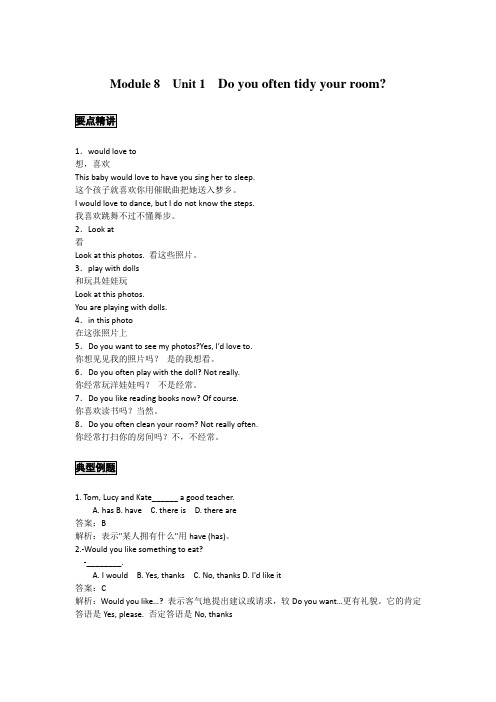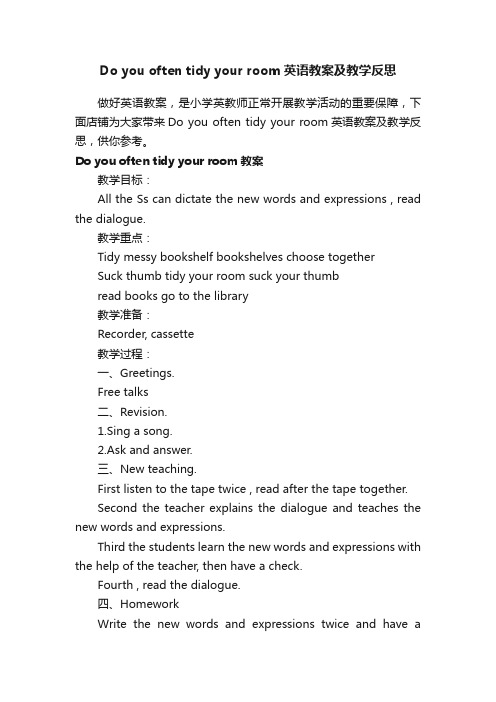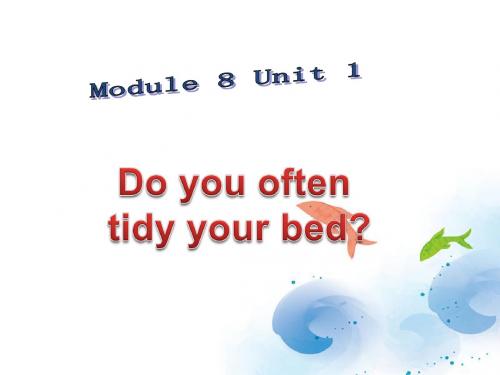module 8 Do you often tidy your room
Module8Unit1Doyouoftentidyyourroom(课件)六年级英语(一起(完整版

Task
We are going to find out if you know your partner well!
What does he/she always do ? What does he/she often do? What does he/she sometimes do? What does he/she seldom do? What does he/she never do?
• Then what will Lingling and Amy do?
They will choose
some books and read together.
Read, retell, or act it out !
•
For retell
• Amy likes ________ room. She can play ________ in a _______ room. She can’t play in a ______ room. • So Amy __________ her room every day. • She doesn’t often tidy her _______. So she _______ find her books! Lingling helps her _______ her bookshelf. • Now the books are _____. They can _____
• How often does Amy tidy her bookshelf?
• A. Not very often. B. Every day.
• How is Amy’s bookshelf before Lingling’s help?
小学英语精讲精析 Do you often tidy your room

Module 8 Unit 1 Do you often tidy your room?1.would love to想,喜欢This baby would love to have you sing her to sleep.这个孩子就喜欢你用催眠曲把她送入梦乡。
I would love to dance, but I do not know the steps.我喜欢跳舞不过不懂舞步。
2.Look at看Look at this photos. 看这些照片。
3.play with dolls和玩具娃娃玩Look at this photos.You are playing with dolls.4.in this photo在这张照片上5.Do you want to see my photos?Yes, I’d love to.你想见见我的照片吗?是的我想看。
6.Do you often play with the doll? Not really.你经常玩洋娃娃吗?不是经常。
7.Do you like reading books now? Of course.你喜欢读书吗?当然。
8.Do you often clean your room? Not really often.你经常打扫你的房间吗?不,不经常。
1. Tom, Lucy and Kate______ a good teacher.A. hasB. haveC. there isD. there are答案:B解析:表示"某人拥有什么"用have (has)。
2.-Would you like something to eat?-________.A. I wouldB. Yes, thanksC. No, thanksD. I'd like it答案:C解析:Would you like…? 表示客气地提出建议或请求,较Do you want…更有礼貌。
Module8Unit1Doyouoftentidyyourbed表格式教案(含教学反思)

3. How often does Amy tidy her bed?
4. Can Amy find her books ? Why
Learn the word : tidy messy
Step 4 Practice.
1. Listen and read the text after the tape .
2. Read and practice the text by themselves .
3. Fill in the blanks with the given words.
tidies , tidy , messy , find , often
Amy is tidying Tom’s room . He doesn’t often tidy his room . Lingling is helping her .
教学重、难点 重点: 1.全体学生能听懂会说新单词:coin ever tidy messy 2.全体学生理解、能够会说介绍自己日常行为的句子。 难点:介绍自己经常或不经常做的事。
教学过程 Step 1 Warm up 1. Greetings. 2.Pair work : What do you often do at the weekend?
教学基本信息
课题
Module 8 Unit 1 Do you often tidy your bed?
课型
听说课
年级
六年级
教学目标 1. 全体学生能听懂会说新单词: coin ever tidy messy 2. 全体学生能理解本课内容。 3. 全体学生能理解、会说介绍自己的日常习惯。 4. 养成良好的行为习惯。
Step 2 Lead in A: I tidies my room and I found a coin. B: You should tidy your room every day. Then you’ll find a coin every day . Learn a word : coin Step 3 Presentation
Doyouoftentidyyourroom英语教案及教学反思

Do you often tidy your room英语教案及教学反思做好英语教案,是小学英教师正常开展教学活动的重要保障,下面店铺为大家带来Do you often tidy your room英语教案及教学反思,供你参考。
Do you often tidy your room教案教学目标:All the Ss can dictate the new words and expressions , read the dialogue.教学重点:Tidy messy bookshelf bookshelves choose togetherSuck thumb tidy your room suck your thumbread books go to the library教学准备:Recorder, cassette教学过程:一、Greetings.Free talks二、Revision.1.Sing a song.2.Ask and answer.三、New teaching.First listen to the tape twice , read after the tape together.Second the teacher explains the dialogue and teaches the new words and expressions.Third the students learn the new words and expressions with the help of the teacher, then have a check.Fourth , read the dialogue.四、HomeworkWrite the new words and expressions twice and have adictation.Read the dialogue three times.板书设计:Tidy chooseMessy tidy your roomSuck suck your thumbThumb read booksBookshelf go to the libraryDo you often tidy your room教学反思本模块主要是要求学生学会用所学的一般现在时态对日常发生的行为给予回应。
Module8 Unit 1 Do you often tidy your bed? (教案)外研版

Module8 Unit 1 Do you often tidy your bed?教学目标1.能够准确理解并运用本单元所学习的单词和短语;2.能够听懂、会说、会读、会写本单元所学的对话;3.能够表达自己在家中的日常生活,以及自己对日常生活的看法和观点;4.能够与他人交流、合作,完成针对日常生活的任务。
教学重点1.理解并掌握本单元的词汇和短语;2.运用所学的课文内容,学生之间进行交流和合作。
教学难点1.能够在口语表达和书写中准确地运用所学到的语言表达;2.能够准确理解并应用日常生活中的常用短语。
教学准备1.教师备课笔记;2.课件和PPT。
教学内容1.自我介绍,让学生分组进行交流;2.提问学生们是否经常整理床铺,然后进行简单的回答;3.让学生们在小组会上讨论他们对于整理床铺的看法及重要性,并进行分享。
教学方式1.交互式教学;2.小组合作。
教学过程导入(5分钟)教师介绍本节课的主题,自我介绍,并问学生们是否经常整理床铺。
学生们回答问题,并简单陈述。
通过这样的交流,学生们可以更好的介入到课程当中。
提问(10分钟)教师又向学生提问,他们对整理床铺的看法和重要性是怎么样的。
教师可以在小黑板上记录学生的回答,以促进他们参与讨论。
讨论(25分钟)教师将学生按小组分组,然后让他们在小组内进行讨论,讨论内容包括:1.学生们经常是否整理床铺;2.对于整理床铺的看法和重要性如何;3.床铺整齐对于个人和家庭的作用。
学生们在讨论完毕后,教师会挑选部分小组进行分享。
在分享的过程中,教师可以让学生们充分发表自己的看法和观点,同时也可以对他们的表现进行点评。
小结(5分钟)教师提醒学生们整理床铺的重要性,同时也对参与讨论的学生给予表扬,鼓励他们在平日生活中采取更加积极健康的生活方式。
教学反思整理床铺是一项非常简单的生活习惯,但是它也具备很多的好处。
本节课通过小组讨论,引导学生们认识到床铺整齐的重要性,以及它对于个人和家庭的影响。
Module 8 Unit 1 Do you often tidy your bed 课件

I often tidy my room.
整理,收拾
On Monday, I tidy my room.
On Tuesday, I tidy my room.
On Wednesday, I tidy my room.
……
Yes , every day. 每一天
My home is very tidy.
tidy(动词)整理,收拾,弄整齐。
1.I’m tidying my room. 2.Do you often tidy your room? 4.Do you often tidy your bookshelf? 5.I will tidy your bookshelf.
tidy(形容词)整洁的,整齐的。
1.story—stories(故事)
country---countries(国家);
library—libraries(图书馆);
family---families家庭
factory—factories工厂; city-cities城市; library-libraries图书馆 以辅音加y结尾的要变y为i加es 2.以o结尾的有生命的名词复数加es
4.其他的:man-men男人; woman-women女人; child-children孩子;sheep—sheepften tidy my room. Do you often tidy your room? Yes, I do. No, I don’t.
Listen and answer.
Does Amy often tidy her room?
Yes,she does.
Does she often tidy her bookshelf? No,she doesn’t.
新外研版英语六年级上册Module 8 Unit 1 Do you often tidy your room表格式教学设计
Ⅱ. Presentation (介绍新语言项目)
a.接着教师出示两个人物,Lingling和Amy,让学生猜一猜,他们经常做什么?(Does lingling often…?)
b.当学生回答后,教师重复说出短语,并指出今天我们要争做“爱好小调查员”。
A . do B. does C. Doittle brother .
A . for B. in C. to D. from
3. The room is. We should tidy them .
A . tidy B. messy C. good D. your
二次备课
一般现在时
标志词:
always
often
usually
sometimes
never
注意:
主语单三,动词单三变化+s/es
主语非单三,动词原形。
让学生总结一般现在时的各种句型。
注意do及do的各种形式后动词用原形。
肯定句
否定句
一般疑问句(本课重点)
板
书
设
计
Module 8 Unit 1 Do you often tidy your room?
当教师说:play football,凡是写这个活动内容的学生
都站起来说:We often play football.
d.分角色朗读课文,可以以竞赛的形式展开。
Ⅳ. Production (任务完成)
a.可以结合本课开展同桌间或是跨组间的调查活动:推荐表格如下
Do you often…?
I
My partner
c.让学生观看今天的课文CD-ROM.
六年级上册英语教案-Module8 Unit1 Do you often tidy your bed
六年级上册英语教案-Module8 Unit1 Do you often tidy yourbed-外研社(一起)教学目标1.能够正确表达日常生活中的家务活2.能够运用所学语言描述自己的家务劳动3.能够提高自己的英语口语能力教学重点1.学生能够掌握日常生活中的家务活2.学生能够说出自己做过的家务劳动3.生活中应该积极参与家务劳动,培养孩子的自我管理和责任感教学难点1.学生能够用正确的语言表达自己的家务劳动2.培养学生的英语口语能力教学准备1.教师准备PPT课件、教案、制作小组卡片2.学生准备好文具以及乐于合作的态度教学过程Step 1 自我介绍(10分钟)教师向学生介绍自己,让学生更好地了解自己的老师。
Step 2 导入新知(20分钟)1.教师让学生听一首歌曲(Tidy Up),学生可以一边听一边跟唱。
歌曲结束后,询问学生是否听懂了歌词中涉及到的家务活。
了解学生对家务活的认知程度。
2.将家务劳动图片贴在墙上,学生分组进行讨论家务劳动的表达方式。
3.教师介绍家务活的英语表达方式及常用短语,家长给予学生家务劳动的轮流做法以帮助学生在表达中运用。
Step 3 组内讨论(25分钟)1.教师将学生分成小组,每组由5-6人组成,组员之间相互合作,共同完成卡片制作。
卡片上写有家务劳动的名称和图片。
2.小组讨论,积极交流,商量表达方式并制作出卡片。
3.各小组派出代表介绍卡片。
Step 4 家务劳动比赛(35分钟)1.教师将学生分成小组,两两匹配,进行家务劳动比赛。
2.教师以轮流形式提问,一个小组回答完以后再请另一个小组继续回答,直到问题答完。
先回答正确几次的小组获胜。
3.得分高的小组获得双倍积分卡片,便于以后进一步挑战。
Step 5 总结反思(10分钟)1.教师发放不同的考试卷子,学生填写自己在本次课目中掌握的程度并完成反思和评价题目。
2.学生通过小组讨论、家务劳动比赛等活动,反思自己在本次课程中的收获和成长,分享属于自己的观点。
Module 8 Unit 1 Do you often tidy your bed(说课稿)-20
Module 8 Unit 1 Do you often tidy your bed(说课稿)课程背景Module 8 Unit 1 是英语六年级上册的学习内容,属于语法部分的动词时态。
本课时的主题是“做家务”,通过学习本课时,学生将能够掌握现在时态的用法,并能够使用现在进行时态描述正在进行中的动作。
教学目标1.理解现在时态的概念和用法。
2.学习nowadays, often, sometimes, seldom, never等词汇,能够准确地运用这些词汇描述做家务的频率。
3.掌握现在进行时态的构成和用法,能够用现在进行时态描述正在进行的动作。
4.通过练习,能够灵活运用现在时态和现在进行时态。
教学重难点1.现在时态的概念和用法。
2.现在进行时态的构成和用法。
3.课文中的词汇和句子理解。
教学准备1.教师备课笔记、教学PPT。
2.范例句子和练习题。
3.黑板、彩笔。
教学过程导入1.播放一段关于家务的视频,引入话题。
2.自我介绍并询问学生过去家务经历,让学生与语言环境接轨。
学习课文1.教师播放录音或读出课文,让学生跟读。
2.对于课文中的难点句子和词汇,逐一解释并举例。
语法讲解1.现在时态的构成和用法。
–表示现在正在发生或存在的动作或状态。
–构成:主语 + 现在时态动词。
–例句:I tidy my bed every day.2.现在进行时态的构成和用法。
–表示正在进行的动作。
–构成:主语 + am/is/are + 现在分词。
–例句:I am tidying my bed now.练习1.利用学生已有的家务常识,带领学生造句,使用现在时态和现在进行时态。
2.依据练习,纠正学生语法错误,并做出评价。
总结1.总结本节课所学内容,确认学生掌握情况。
2.提出下一步教学内容和任务。
课后作业1.总结课上所学内容,写出重点句子和词汇。
2.写一篇100词左右的“我的家务”,使用现在时态和现在进行时态,描述你现在在做的家务和你经常做的家务。
外研版(一起)六上Module 8《Unit 1 Do you often tidy your bed》ppt课件2
f. How often do you exercise?
g. How often do you go to see the doctor? h. How often do you drink coffee?
i. How often do you go out for dinner?
•
Listen & Answer
• How often does Amy tidy her room?
• A. Not very often.
B. Every day.
• How often does Amy tidy her bookshelf?
• A. Not very often.
B. Every day.
•
For retell
• Amy likes ________ room. She can play ________ in a _______ room. She can’t play in a ______ room.
• So Amy __________ her room every day. • She doesn’t often tidy her _______. So she
Listen & Answer
• How often does Amy tidy her room?
• A. Not very often.
B. Every day.
• How often does Amy tidy ten.
B. Every day.
Game
How well do you know your partner?
- 1、下载文档前请自行甄别文档内容的完整性,平台不提供额外的编辑、内容补充、找答案等附加服务。
- 2、"仅部分预览"的文档,不可在线预览部分如存在完整性等问题,可反馈申请退款(可完整预览的文档不适用该条件!)。
- 3、如文档侵犯您的权益,请联系客服反馈,我们会尽快为您处理(人工客服工作时间:9:00-18:30)。
tidy
1.I’m tidying my room. 2.Do you often tidy your room?
3.We can play well in a tidy room?
4.Do you often tidy your bookshelf? 5.I will tidy your bookshelf. 6.Now your books are tidy.
tidy(形容词)整洁的,整齐的。
ma messy room
It’s very messy.
mess 名词 乱,不整洁
messy 形容词 乱的,不 整洁的
Find
• • • • • • • • • • 1. We can play well in a tidy room. 2. We can’t play in a messy room. 3. I can’t find my books. 4. You can choose some books. 5. Then we can read them together. 总结:情态动词 can 后加动词原形 6.I will help you. 7. I will tidy your bookshelf. 8. Let’s read! 总结:一般将来时will和let后加动词原形
what do you want to do?
• • • • • • Want 相要 Want sth I want some apples. want to do sth 想要做某事 Daming wants to watch TV. want sb to do sth 想让某人做某事 My mother wants me to tidy my room.
Does ZhaoBenshan often sing a song? Yes, he does. No, he doesn’t. listen to music make films(拍电影) live in LiaoNing
Does NaYing often……
Yes, she does.
No, she doesn’t. sing songs dance help poor children
Language points
• What are you doing? I’m tidying my room. • 现在进行时,强调正在发生,正在进行的动作或 状态。 结构:be +doing • 动词变现在分词的规则: • 1.直接加ing play—playing listen—listening • 2. 以不发音e结尾,去e再加ing • dance—dancing take—taking • 3. 重读闭音节,双写尾字母,再加ing • sit swim put run get stop clap shop
两人一组口语练习 Do you often……
• A. Do you often suck your thumb? • B. No, I don’t .
•
wash clothes/ fly kites/ ride a bike/read books/ tidy your room
Does she/he/it ……
一般现在时
• Often , always , usually , sometimes 一般现在 时的标志,经常,通常的习惯性的动作或状态 • 例: • I often tidy my room.(肯定句) • I don’t often tidy my room.(否定句) • Do you often tidy your room ? 一般疑问句 • Yes, I do./No, I don’t. • What do you often do ?(特殊疑问句) •
Do you often read stories?
Do you often tidy your room?
tidy your room
Do you often tidy your bookshelf?
tidy your bookshelf
We can play well in a tidy room.
• 3. How often does Amy tidy her room?
Every day.
• 4. Does Amy often tidy her bookshelf?
No, she doesn’t.
• 5. What does Amy want to do ?
She wants to read books
tidy(动词)整理,收拾,弄整齐。
1.I’m tidying my room. 2.Do you often tidy your room? 4.Do you often tidy your bookshelf? 5.I will tidy your bookshelf. 3.We can play well in a tidy room? 6.Now your books are tidy.
主语是第三人称单数
• Daming often reads books. • Daming doesn’t often read books. • Does Daming often read books? • Yes, he does. /No, he doesn’t. • What does Daming often do? • 总结:如果主语是三单,肯定句中动词词尾需要 加s/es.疑问句does+动原 否定句doesn’t+动原
a tidy room
We can’t play well in a messy room
a messy room
Listening
• 1. What is Amy doing ?
She is tidying her room
• 2. Does Amy often tidy her room?
Yes, she does.
Do you often go to the library?
go to the library
Do you often go swimming?
go swimming
Do you often play computer games?
play computer games
story(单)-stories(复)
Do you often…? Yes,I do. Does he/she/it often…?
No, I don’t.
Yes,he/she/it does.No,he/she/it doesn’t. I /You/We/They often…
He/She/It often __s/es …. I/You/We /They don’t often…. He/She/It doesn’t often…
Unit 1 Do you often tidy your room?
Do you often read books?
Yes, I do. / No, I don’t.
Do you often play football? Yes, I do./No, I don’t.
play football
